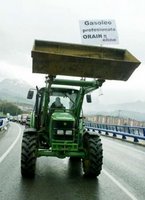Spain is a weird place.
Arnaldo Otegui, leader of the banned political party Batasuna has been sentenced to one year for "slandering" King Juan Carlos.
MADRID, Spain - Spain's Supreme Court sentenced radical pro-Basque independence leader Arnaldo Otegi to a year in prison Friday for slandering King Juan Carlos by saying he was in charge of torturers.
Otegi made the remark during a news conference coinciding with a visit by the monarch to the Basque region on Feb. 26, 2003. He described the king as "maximum chief of the Spanish army, in other words, the person responsible for the torturers."
Otegi was tried on the charges by the Basque region's Superior Tribunal in March, but was absolved on the basis that the right to freedom of expression entitled him to make the remarks. The prosecution appealed the verdict to the Supreme Court.
Otegi's remarks "express a blatant contempt for his majesty the king and the institution he represents, affecting the very core of his dignity by attributing to him one of the gravest crimes in a state of law," the Supreme Court said in its ruling.
Otegi, 47, announced Friday he would appeal the sentence to the Constitutional Court.
In any case, the Basque leader will not have to go to jail for the moment as sentences of under two years are suspended in Spain.
First of all, it is hard to slander a person that is today an ornament in Spain's political spectrum thanks to no one else that Herr Adolph Hitler.
The Fuhrer's little king came to power as a decision by falangist dictator Francisco Franco, who in turn was able to seize power in Madrid thanks to the military help of Nazi Germany under Hitler and Fascist Italy under Benito Mussolini on one side, and the countries that abided by the non-intervention treaty out of cowardice and a primal fear towards communism.
Attacked by the two powerful military machineries of Germany and Italy, and deserted by England, the United States of America and France, the Spanish, Basque and Catalonian Republics were defeated after presenting a courageous and honorable fight.
It is within that frame that Franco became Spain's dictator, and it is within that scenario that Juan Carlos came out of nowhere to become king.
And so, two totalitarian figures were imposed on the Basques, the oldest democracy in Europe by no one else than Hitler, yes, the same Hitler responsible for the Roma and Jewish holocaust.
About the only nice thing that this Juan Carlos did was to renounce to becoming the head of state in Spain after Franco's death.
Many congratulate him for that. They say he ushered democracy in Spain.
All of it is horse manure.
If Juan Carlos believed in democracy the correct thing to do was to abdicate and scratch monarchy from the Spanish political landscape.
To do that would take a lot of fortitude, and the will to renounce to the nice allowance that Spain gives its royalty. And well, it would take the moral stance of a saint to renounce to so much money.
But lets analyze Otegi's words:
He described the king as "maximum chief of the Spanish army, in other words, the person responsible for the torturers."
Fact number one, king Juan Carlos IS the maximum chief of the Spanish army.
Fact number two, torture of Basque political prisoners is rampant in Spain.
Spain has done absolutely nothing to stop the widespread practice of torture in its police headquarters and jails, Spain even called the UN's Special Rapporteur Theo van Boven a liar not too long ago.
Just a few days ago a Basque prisoner committed suicide as a result of the psychological trauma caused by the torture he endured.
And Juan Carlos does nothing to stop the torture, the dispersion, the oppression.
So yes, he is in fact the Chief Torturer in Spain.
No slander, just the simple truth.
.... ... .















